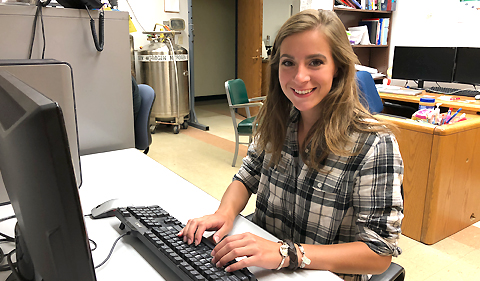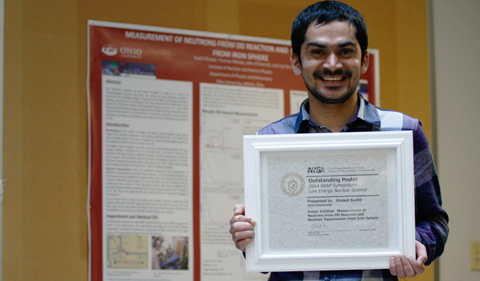By Brittney Kenady
(B.S. Physics Astrophysics, College of Arts & Sciences, Class of 2021)
My summer research with Dr. Carl Brune at Ohio University’s Edwards Accelerator Laboratory involved comparing methods of calibrating our NE213 neutron detectors by using data collected from previous experiments and analyzing it with a new code. Other aspects included operator training that involved general lab safety, theory behind how the accelerator works and of course the actual operation for experiments.
Nuclear physicists from the Lawrence Livermore National Laboratory in California came to use our facility to test various gases (and other materials) for determining which created the most neutrons, as well as which best blocked them, for future use in developing things like better shielding from radiation.
This has been a fantastic learning experience for me. Just being around the lab and talking to and working with the staff, faculty members, and graduate students and seeing how experiments are actually done has been great, since it’s difficult to form an accurate concept of these things with nextto-no knowledge or exposure to the processes. One thing in particular that I found very useful even outside the lab is an increased level of computer competence! I’ve been introduced to programming languages I’d never even heard of (and seen their versatility), learned to work more efficiently with terminal windows (and not to be as reliant on graphical interfaces, which aren’t always readily available), received the hands-on experience of trouble-shooting and editing code (and gaining a better understanding of how it’s used in data analysis).
I’ve improved my ability to process and use multiple info points at once – like being able to walk into the control room, and see the status of the accelerator, it’s energy, current, target voltage, beam path, type of target, etc. and then using that information to continue/assess/correct things while running an experiment. I also gained a better appreciation for each person’s unique and necessary specialization. I very much enjoyed working with everyone, and appreciate that they took the time to teach me even a small amount of knowledge from their years of experience.
I was in the lab pretty much since the week after school ended – early on, I was there every day, all day (which included meeting with my advisor most of those days); later (because of a long commute), it became less frequent, as I could continue to work remotely.
I find astrophysics fascinating because I love exploration and understanding of the universe around me. To me, astrophysics combines both of those things beautifully, and is about as far-reaching as I can get. I am able to get a glimpse of processes in the lab like those that happen inside stars. I enjoy learning how these things work and being able to explain and predict outer space phenomena.




















Comments